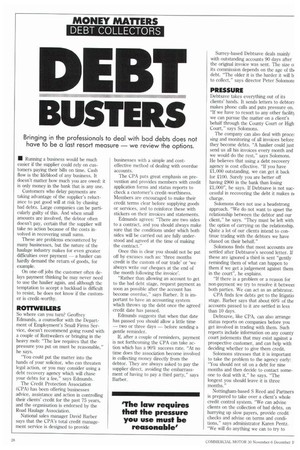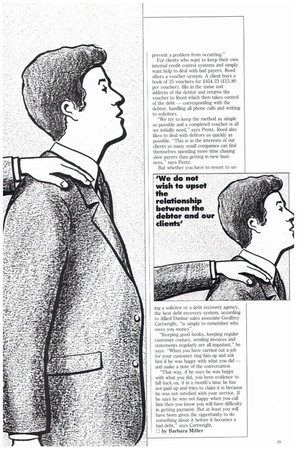DEBT BUSTERS
Page 30

Page 31

If you've noticed an error in this article please click here to report it so we can fix it.
• Running a business would be much easier if the supplier could rely on customers paying their bills on time. Cash flow is the lifeblood of any business. It doesn't matter how much you are owed: it is only money in the bank that is any use.
Customers who delay payments are taking advantage of the supplier's reluctance to put good will at risk by chasing bad debts. Large companies can be particularly guilty of this And when small amounts are involved, the debtor often doesn't pay, certain that the supplier will take no action because of the costs involved in recovering small sums.
These are problems encountered by many businesses, but the nature of the haulage industry makes for even greater difficulties over payment — a haulier can hardly demand the return of goods, for example.
On one-off jobs the customer often delays payment thinking he may never need to use the haulier again, and although the temptation to accept a backload is difficult to resist, he does not know if the customer is credit-worthy.
RO1TWEILERS
So where can you turn? Geoffrey Edmunds, a counsellor with the Department of Employment's Small Firms Service, doesn't recommend going round with a couple of Rottweilers or bringing in the heavy mob: "The law requires that the pressure you put on must be reasonable," he says.
"You could put the matter into the hands of your solicitor, who can threaten legal action, or you may consider using a debt recovery agency which will chase your debts for a fee," says Edmunds.
The Credit Protection Association (CPA) has been offering businesses advice, assistance and action in controlling their clients' credit for the past 75 years, and the organisation is endorsed by the Road Haulage Association.
National sales manager David Barber says that the CPA's total credit management service is designed to provide businesses with a simple and costeffective method of dealing with overdue accounts.
The CPA puts great emphasis on prevention and provides members with credit application forms and status reports to check a customer's credit-worthiness. Members are encouraged to make their credit terms clear before supplying goods or services, and to reinforce these with stickers on their invoices and statements.
Edmunds agrees: "There are two sides to a contract, and you should always make sure that the conditions under which both sides will be carried out are fully understood and agreed at the time of making the contract."
Once this is clear you should not be put off by excuses such as: `three months credit is the custom of our trade' or 'we always write our cheques at the end of the month following the invoice'.
"Rather than allowing an account to get to the bad debt stage, request payment as soon as possible after the account has become overdue," says Barber. It is important to have an accounting system which throws up the debt once the agreed' credit date has passed.
Edmunds suggests that when that date has passed you should allow a little time — two or three days — before sending a gentle reminder,
If, after a couple of reminders, payment is not forthcoming the CPA can take action which has a 90% success rate. "At no time does the association become involved in collecting money directly from the debtor. They are always asked to pay the supplier direct, avoiding the embarrassment of having to pay a third party," says Barber.
Surrey-based Debtsave deals mainly with outstanding accounts 90 days after the original invoice was sent. The size o its commission depends on the age of du debt. "The older it is the harder it will b to collect." says director Peter Solomon:
PRESSURE
Debtsave takes everything out of its clients' hands. It sends letters to debtor: makes phone calls and puts pressure on. "If we have to resort to any other facilit3 we can pursue the matter on a client's behalf through the County Court or High Court," says Solomons.
The company can also deal with proce: sing and monitoring of all invoices before they become debts. "A haulier could just send us all his invoices every month and we would do the rest," says Solomons. He believes that using a debt recovery agency is cost effective. "If you have 2,000 outstanding, we can get it back for 200. Surely you are better off having E900 in the bank than losing 2,000", he says. If Debtsave is not successful in recovering the debt it makes ni charge.
Solomons does not use a headstrong approach. "We do not want to upset the relationship between the debtor and our client," he says. "They must be left with the option of carrying on the relationship. Quite a lot of our clients intend to continue trading with the debtors we have chased on their behalf."
Solomons finds that most accounts are settled after Debtsave's second letter. If these are ignored a third is sent "gently reminding them of what can happen to them if we get a judgement against them in the court", he explains.
"If there is a problem or a reason for non-payment we try to resolve it betweei both parties. We can act as an arbitrator.
CPA finds few debts get to the litigatio stage. Barber says that about 60% of the accounts passed to it are settled in less than 10 days.
Debtsave, like CPA, can also arrange status reports on companies before you get involved in trading with them. Such reports include information on any county court judements that may exist against a prospective customer, and can help with deciding whether to give them credit.
Solomons stresses that it is important to take the problem to the agency early: "You should not sit on a debt for nine months and then decide to contact someone to deal with it," he says. "The longest you should leave it is three months."
Nottingham-based S Reed and Partners is prepared to take over a client's whole credit control system. "We can advise clients on the collection of bad debts, on hurrying up slow payers, provide credit checks and advise on terms and conditions," says administrator Karen Pentz. "We will do anything we can to try to prevent a problem from occurring."
For clients who want to keep their own internal credit control systems and simply want help to deal with bad payers, Reed offers a voucher system. A client buys a book of 25 vouchers for 2454.23 (215.80 per voucher), fills in the name and address of the debtor and returns the voucher to Reed which then takes control of the debt — corresponding with the debtor, handling all phone calls and writing to solicitors.
We try to keep the method as simple as possible and a completed voucher is all we initially need," says Pentz. Reed also likes to deal with debtors as quickly as possible. "This is in the interests of our clients as many small companies can find themselves spending more time chasing slow payers than getting in new business," says Pentz.
But whether you have to resort to us ing a solicitor or a debt recovery agency, the best debt recovery system, according to Allied Dunbar sales associate Geoffrey Cartwright, "is simply to remember who owes you money".
"Keeping good books, keeping regular customer contact, sending invoices and statements regularly are all impotant," he says. "When you have carried out a job for your customer ring him up and ask him if he was happy with what you did — and make a note of the conversation.
"That way, if he says he was happy with what you did, you have evidence to fall back on, if in a month's time he has not paid up and tries to claim it is because he was not satisfied with your service. If he says he was not happy when you call him then you know you will have difficulty in getting payment. But at least you will have been Oven the opportunity to do something about it before it becomes a bad debt," says Cartwright.
0 by Barbara Miller
















































































































